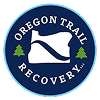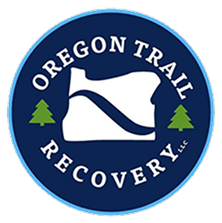Trauma-Informed Care: Healing Beyond Addiction

Key Takeaways
Here’s a quick look at the following page:
- What Is Trauma?: Trauma is any overwhelming experience that causes lasting emotional wounds, and it can take the form of acute, chronic, or complex trauma.
- Trauma’s Role in Addiction: Trauma increases addiction risk, as substances temporarily numb emotional pain, creating a cycle where substance use worsens trauma symptoms.
- Oregon’s Mental Health Crisis: Oregon faces high suicide rates and rising trauma cases, with methamphetamine and opioid use amplifying the need for trauma-informed care.
- Oregon Trail Recovery’s Approach: We offer trauma-informed care using evidence-based methods like Seeking Safety, providing residential and outpatient treatment to address addiction and trauma together.
- Breaking Stigma and Sustaining Recovery: Trauma-informed care reduces stigma by explaining addiction’s roots in trauma, while aftercare and lifestyle changes support long-term healing.
Contact Oregon Trail Recovery for compassionate, evidence-based support to start your journey toward healing from trauma and addiction.
Important Note
Oregon Trail Recovery is not certified or licensed as a mental health treatment provider. However, our team uses trauma-informed care through evidence-based approaches like the Seeking Safety curriculum.
This helps us support mental health challenges within addiction recovery while ensuring each client's story is heard and honored.
What Is Trauma?
Trauma is any experience that overwhelms your ability to cope and leaves lasting marks on the mind and body. It reshapes how you respond to stress and can make everyday challenges feel harder to manage.
Trauma doesn't just mean major events like car accidents or violence. It can include childhood neglect, emotional abuse, or witnessing a threatening or scary situation. The key isn't what happened – it's how the experience affected you.
The Importance of Trauma-Informed Care
Research shows that trauma affects as many as 13 million Americans.1
Also, up to 80% of people seeking treatment for substance use disorders report a history of trauma.2
Trauma-informed care starts with the understanding that many people seeking recovery have lived through painful experiences. Rather than focusing on what’s wrong, this approach looks at what happened. That shift in perspective helps create a foundation of safety, trust, and genuine healing.
How Trauma Contributes to Substance Use Disorders
Trauma and addiction are deeply connected. For many, substances can feel like a way to ease unbearable pain, offering temporary relief from overwhelming memories or emotions. But this relief comes at a cost, meaning trauma often leads to substance use, and substance use can create more trauma in return.3
When traumatic experiences push past your natural coping abilities, alcohol or drugs may seem like quick fixes. A drink might quiet racing thoughts. Certain drugs might bring sleep or blunt anxiety.
Over time, though, the brain’s reward system gets altered. Trauma disrupts neurotransmitters that regulate stress and mood, and substances change those same pathways, making it harder and harder to feel okay without them.4
Interaction Between Trauma and SUD
Research highlights just how strong this link is: between 25-76% of teens with substance use disorders first experienced trauma before their addiction developed.5
Breaking this cycle requires care that addresses both trauma and addiction at the same time, and our team at Oregon Trail Recovery can help.
Oregon's Mental Health Crisis: The Numbers Tell a Story
Oregon faces significant mental health challenges that highlight the need for trauma-informed care. The state ranks 9th in the U.S. for suicide rates, with 883 people dying by suicide in 2022. This represents 19.3 deaths per 100,000 people.6
These numbers show that more and more Oregonians are struggling with mental health crises.
Finding Support Through Oregon Trail Recovery
Oregon Trail Recovery provides compassionate, evidence-based treatment that integrates trauma-informed care principles.
Our team understands that addiction often stems from attempts to cope with painful experiences. Our approach centers on "love with an edge,” meaning we care deeply about our clients while maintaining healthy boundaries.
This balance creates safety and a comfortable place to heal, which is a core principle of trauma-informed care.
Treatment and Healing at Oregon Trail Recovery
Trauma-informed care at Oregon Trail Recovery means we recognize how past experiences affect present behaviors. We don't judge clients for their symptoms or struggles. Instead, we help them understand the connections between their trauma and substance use.
Our outpatient care, including our partial hospitalization program (PHP) and intensive outpatient program (IOP), provides safe, supervised environments for healing trauma addiction.
At Oregon Trail Recovery, clients build practical life skills while working through the trauma that may have fueled their addiction. By healing both together, recovery becomes stronger and more sustainable.
Evidence-Based Treatment Modalities
Oregon Trail Recovery uses proven treatment methods that integrate trauma-informed care principles into our recovery model. Some evidence-based treatment options we utilize include:
Seeking Safety
This forms the foundation of our trauma therapy programming. This evidence-based curriculum specifically addresses co-occurring PTSD and substance use disorders. It helps clients develop coping skills for trauma symptoms without using substances.
Cognitive Behavioral Therapy (CBT)
CBT helps clients identify and change thought patterns that contribute to both trauma symptoms and addiction. This approach teaches practical skills for managing triggers and cravings.
Dialectical Behavioral Therapy (DBT)
DBT focuses on emotional regulation and distress tolerance. These skills are especially important for trauma recovery, as trauma often involves overwhelming emotions.
The 12-Step Model
This provides peer support and spiritual foundation for recovery. Many clients find that addressing trauma enhances their ability to work the steps effectively.
Medication Assisted Treatment (MAT)
When combined with trauma-informed care, medications can reduce cravings while therapy addresses underlying trauma. This is effective for those with co-occurring substance use disorder as well.
Outdoor Adventure Therapy
This uses nature-based activities to promote healing. Oregon's beautiful landscape provides perfect settings for trauma recovery through hiking, fishing, and other outdoor pursuits.
Breaking the Stigma Around Trauma and Addiction
Stigma keeps far too many people from reaching out for the care they deserve. Too often, addiction is misunderstood as a moral weakness rather than what it truly is – a health condition deeply connected to trauma and changes in the brain.
At Oregon Trail Recovery, we believe silence only fuels shame. As we often say, “If no one talks about it, does it really happen? Yes, it does. That’s why we have to.” Speaking openly about trauma and addiction helps break down the barriers that keep people isolated.
Taking the First Step in Healing
Trauma-informed care plays a powerful role in reducing stigma. By explaining the science behind how trauma reshapes the brain and body, we replace judgment with understanding.
Many of our clients come to realize that their reactions were not weakness but normal responses to overwhelming situations. This insight is often the first step toward healing.
Education is also key. When families and communities learn how trauma impacts recovery, they can provide more meaningful support. Together, we can create environments where compassion replaces shame.
Sustaining Wellness After Treatment
Recovery doesn’t end when treatment does – it grows into a lifelong journey of healing, self-care, and personal growth. With the right tools and support, clients learn to navigate triggers and build lives that feel whole again.
Trauma-informed care principles continue to guide recovery long after leaving treatment. With aftercare recovery, clients will learn to recognize trauma triggers and use healthy coping strategies instead of substances. This awareness becomes a powerful tool for maintaining sobriety.
Aftercare planning begins during treatment at Oregon Trail Recovery. While our alumni services are currently limited, we're working to expand these offerings, because we know strong aftercare programs improve long-term trauma recovery outcomes.
Importance of Building a Support Network
Long-term healing requires more than just completing a treatment program – it’s about building a strong foundation of support and healthy habits that sustain recovery.
A support network may include ongoing therapy, support groups, sponsors, or trusted loved ones who walk alongside you. For many, trauma therapy continues in outpatient care, offering tools to address triggers and deepen healing over time.
Lifestyle choices also play a key role. Regular exercise, balanced nutrition, quality sleep, and stress management help restore balance to a nervous system impacted by trauma. These practices strengthen both body and mind, making it easier to face challenges in recovery.
Above all, trauma-informed care emphasizes empowerment. Recovery isn’t about being defined by your past – it’s about learning to make choices that support your growth. At Oregon Trail Recovery, we help clients reclaim that sense of control so they can move forward with confidence and hope.

The Path Forward: Hope and Healing
Recovery from trauma and addiction is possible with the right support and treatment approach. Trauma-informed care provides a roadmap for healing that honors each person's unique experience and strengths.
Oregon Trail Recovery stands ready to support your journey toward freedom from drugs and alcohol. Our team combines professional expertise with personal experience to create an environment where trauma recovery can flourish.
The connection between trauma and addiction is complex, but understanding this relationship opens doors to effective treatment. When we address both issues together through trauma-informed care, clients have the best chance for lasting recovery.
Reach Out for Healing Today
Remember that seeking help is a sign of strength, not weakness. If you or someone you love is struggling with addiction and trauma, compassionate, evidence-based care is available. The trail to recovery may be challenging, but you don't have to walk it alone.
Trauma-informed care offers hope for a future free from the pain of the past and the chains of addiction. With proper support, understanding, and treatment, healing is not just possible – it's probable. Reach out today.
Resources
- https://www.ptsd.va.gov/understand/common/common_adults.asp
- https://pmc.ncbi.nlm.nih.gov/articles/PMC3688835/
- https://nida.nih.gov/research-topics/trauma-and-stress
- https://pubmed.ncbi.nlm.nih.gov/9385000/
- https://www.nctsn.org/sites/default/files/resources/making_the_connection_trauma_substance_abuse.pdf
- https://www.oregon.gov/oha/ERD/SiteAssets/Pages/Government-Relations/200-354350%20Suicide%20Prevention%20Workforce%20Training%20Report%20v6_2024.pdf







